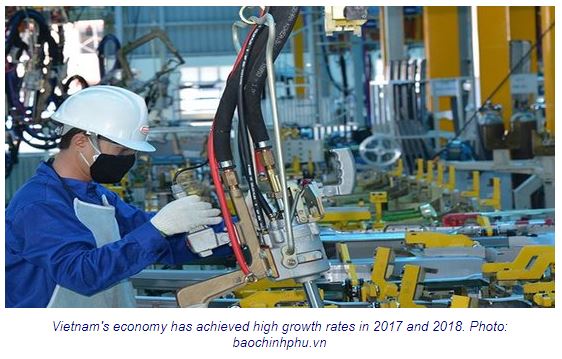Vietnam economy forecast to grow by more than 7% in 2019
Many experts have forecast the Vietnamese economy will enlarge by 7%, and with drastic reforms taken, the growth will reach 7.06%.
The National Center for Socio-economic Information and Forecast (NCIF) has released two growth scenarios for 2019 and 2020. Accordingly, Vietnam’s economy may grow by 6.84%-7.02% in 2019 and 7%-7.2% in 2020.
The NCIF’s report shows that the economic growth in the period of 2016 – 2018 is on the rebound, but improving the quality of growth has not met the target. Labor productivity has improved but still falls short of expectation. The business environment has improved but its impacts have not been widespread. Public debt has declined, but foreign debt and debt servicing are tending to approach the safety limits.
Head of Analysis and Forecasting Department (under NCIF) Dang Duc Anh said that there is a general consensus among the world economic experts who forecast the world economy and international trade would slow down in the face of fluctuations in international commodity prices and the tightening of monetary policy by some major central banks or trade protectionism.
Meanwhile, the domestic situation seems brighter when trade is promoted as some trade agreements (FTAs) have come into effect, economic restructuring is on track, business environment is improving, and consumption is increasing as the middle class is expanding in size, he noted.
Agreeing that the world economic factors are unpredictable, Luu Bich Ho, former director of the Development Strategy Institute under Ministry of Planning and Investment, stressed that it is necessary to look at different scenarios, such as export downturn, macroeconomic instability, global economic crisis, among others, the NCIF should figure out the worst scenario to get the economy prepared.
At a recent seminar, Tran Dinh Thien, former director of the Vietnam Institute of Economics, also affirmed that the 2017 – 2018 period marks a period of high economic growth in Vietnam and this trend will continue for at least two years.
With the goal of keeping the macroeconomic stability and curbing inflation, the target of 6.7% growth is the lower end, and by 2019 the growth rate can reach 7% and the year after would be nearly 7%, Thien predicted.
According to Thien, if the Vietnamese government adopts more dramatic actions, GDP growth in 2019 is likely to reach 7.06%.
The WB has recently forecasted that Vietnam’s GDP would grow by 6.8% in 2018 in the context of stable macro economy. However, in the medium term, Vietnam’s growth would slow down following the global downtrend.
According to the bank’s latest semiannual ‘Taking Stock’ report, Vietnam’s economic growth has proved solid despite many external constraints. This is due to strong domestic demand combined with an increase in export-oriented processing.
Its research shows that Vietnam’s growth is predicted to remain at 6.8% or even higher. The World Bank also gives an over 6.3% growth prediction for emerging economies in East Asia and Pacific.
However, the Vietnamese economy would decelerate in the medium term, affected by the world downtrend. Specifically, Vietnam’s GDP is predicted to decline to 6.6% and 6.5% for 2019 and 2020. Inflation remains under control, according to the World Bank, below 4% due to monetary tightening policy.
WB Country Director for Vietnam Ousmane Dione appreciated what Vietnam has achieved in the context of global challenges. He suggested that policymakers should take advantage of the opportunities and advantages of growth momentum while promoting structural reforms and improving public investment performance.


 English
English




